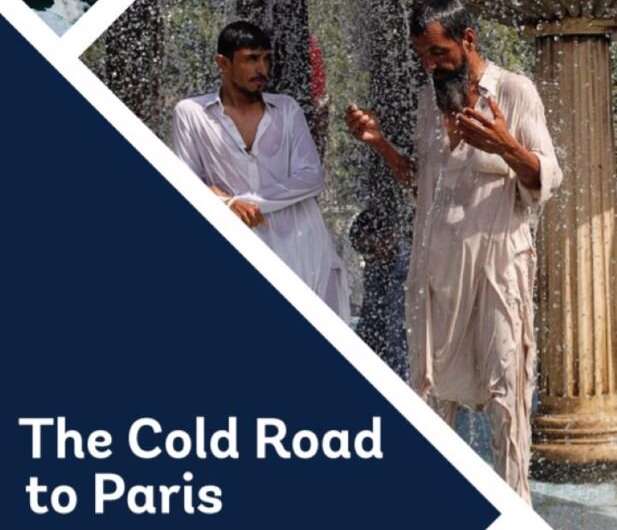Experts draw up roadmap to avert cooling-generated climate catastrophe

A team of experts including researchers from the World Bank Group and University of Birmingham has developed a roadmap to drive the cooling innovations that could help to avoid climate catastrophe, as increasing heat threatens human health and productivity and rising global demand for cooling further raise the planet's temperatures.
Their plan, dubbed the "Cold Road to Paris," calls on governments, industry, and the international community to organize and implement a coordinated strategy to drive out greenhouse gas emissions from cooling by 2050 while at the same time providing the cooling services that are needed to meet the sustainable development goals.
The world is off-track to meet the 2015 Paris Agreement's goal of limiting the rise in global warming to 1.5°C while more than 13 new cooling devices are being deployed every second—making cooling and refrigeration the world's fastest-growing source of greenhouse gas emissions. The world is also off-track to meet the UN's Sustainable Development Goals (SDGs) and adapt to rapidly increasing temperatures due to climate change.
The report, published in time for COP26, calls for radical change. It provides insights into the relationship between cooling and already-agreed-upon climate and development goals; presents the barriers, critical step-changes, and solutions needed to accelerate innovation and transformation; proposes aspirational targets and actions for each decade with the aim of achieving net-zero GHG emissions from cooling applications by 2050; considers financing solutions; and suggests a framework for governments and the global cooling community to take action. The report sets out strategic priorities and actions over three decades:
- Phase 1 (2020–2030)—readiness and quick results;
- Phase 2 (2030–2040)—market transformation and expansion; and
- Phase 3 (2040–2050)—emergence of the sustainable cooling economy.
Report co-author Toby Peters, Professor of Cold Economy at the University of Birmingham, commented: "This report is a very timely and important document for COP 26 to consider. Conventional cooling technologies, such as refrigeration and air conditioning, account for more than 7% of total GHG emissions and their use is growing rapidly.
"The rapid surge in demand for cooling will create a vicious cycle of rising temperatures that increases demand for cooling—thus boosting greenhouse gas emissions and further increasing temperatures. We need radical change in order to provide affordable access to clean cooling for all with minimal climate impact. Piecemeal improvements will not be good enough."
Making decarbonisation policy work in practice will depend on deployment of effective novel technologies, such as those developed at the Birmingham Centre for Energy Storage (BCES). These focus on cost-effective, energy-and-resource-efficient thermal energy storage technologies, which fall into three broad categories: sensible heat storage, thermochemical energy storage, and phase change material (PCM)-based latent heat storage.
The BCES team invented composite phase change materials (cPCMs) - substances that absorb and release thermal energy during the process of melting and freezing. The materials recharge as everyday temperatures fluctuate, making them ideal for a variety of everyday applications that require temperature control.
Lack of cooling, combined with unreliable energy supply, can hamper children's access to routine immunization; lead to severe decreases in economic productivity in sectors such as agriculture, construction, and manufacturing; and result in work-hour losses as high as 12% in the worst-affected regions and food loss of up to 40 percent in some markets.
Together with partners across Europe, Africa and Asia, Centre for Sustainable Cooling experts from Birmingham, London South Bank Cranfield and Heriot-Watt Universities plus international partners are working on this challenge, with a specific focus on cold-chain for food and health systems and rural cooling. Led by Professor Peters, programs looking at resilient and sustainable cooling and cold-chains include:
- UK—A whole system of systems 'farm-to-customer fridge' approach to deliver a clear industry-led pathway to achieve the UK's net zero 2050 target whilst maintaining food security and affordability and supporting economic opportunities.
- EUROPE—A systems approach to redefine European food system architecture and map the opportunities available to reduce CO2 emissions by 50% by 2050.
- AFRICA—Demonstrating, localizing and proving refrigeration and cold-chain technology in-market, the Africa Centre of Excellence for Sustainable Cooling and Cold-Chain (ACES) will also deliver the customer business and financing models and support for the development, of new cold-chains.
- BANGLADESH—Fast-track vaccine cold-chain assessment and design for mass scale COVID-19 vaccination using Bangladesh as the case study.
The Centre's activities contribute to a growing body of evidence that innovative integrated cooling systems provide superior economic and environmental services and can be scaled up through investments by corporations and development organizations for the benefit of people and economies everywhere around the world.
Added Professor Peters, "While heating is important for the UK and other northern hemisphere countries, this is dwarfed by the global demand for cooling, especially in a warming world. Cooling is still a blind spot in the energy debate and given the growth in demand, it will not be solved by greening electricity. The world will need to 'think thermally' to make this happen."
Another contributor to the report, climate finance and policy specialist Alan Miller, added "The roadmap and work of the Centre highlight the multiple benefits attainable through sustainable cooling. Replacing HFCs as called for in an international agreement, the Kigali Amendment, will avoid as much as 0.5C of warming, with additional warming avoided by reductions in power demand. The reduction in air pollution will provide substantial health and economic benefits. All while promoting sustainable development—a true win-win-win."
More information: The Cold Road to Paris : Mapping Pathways Toward Sustainable Cooling for Resilient People and Economies by 2050. openknowledge.worldbank.org/handle/10986/36439
Provided by University of Birmingham




















